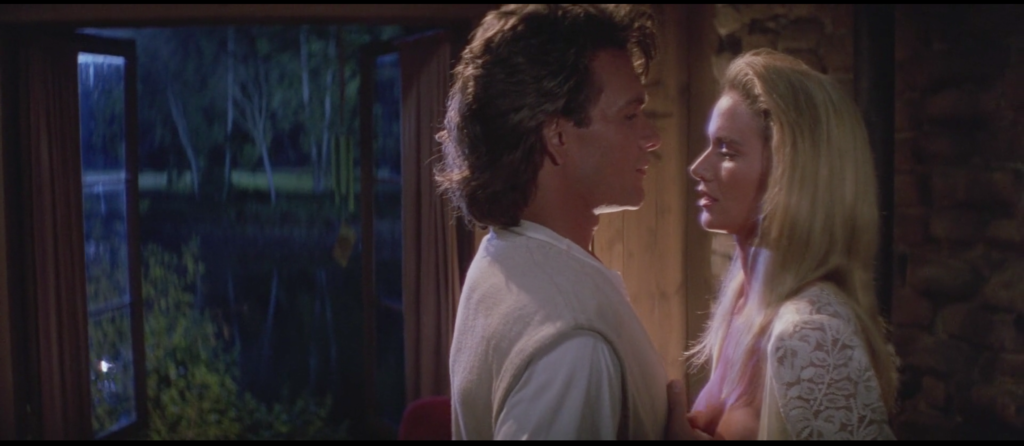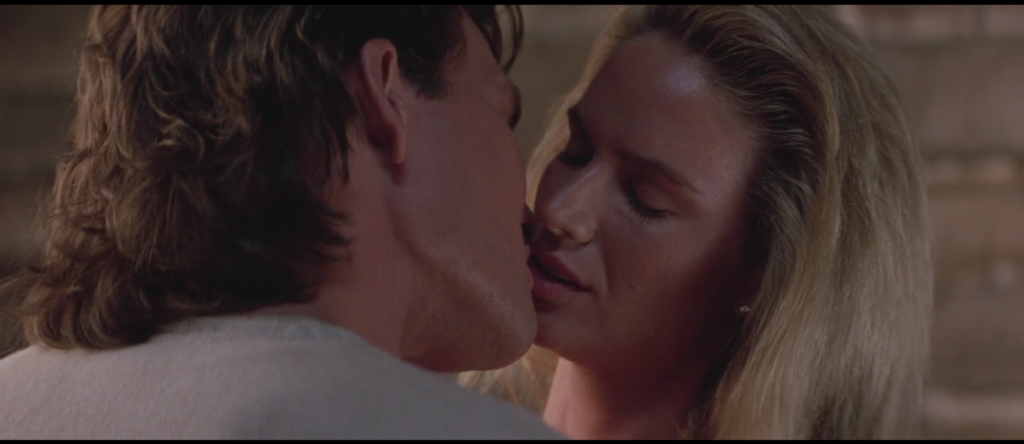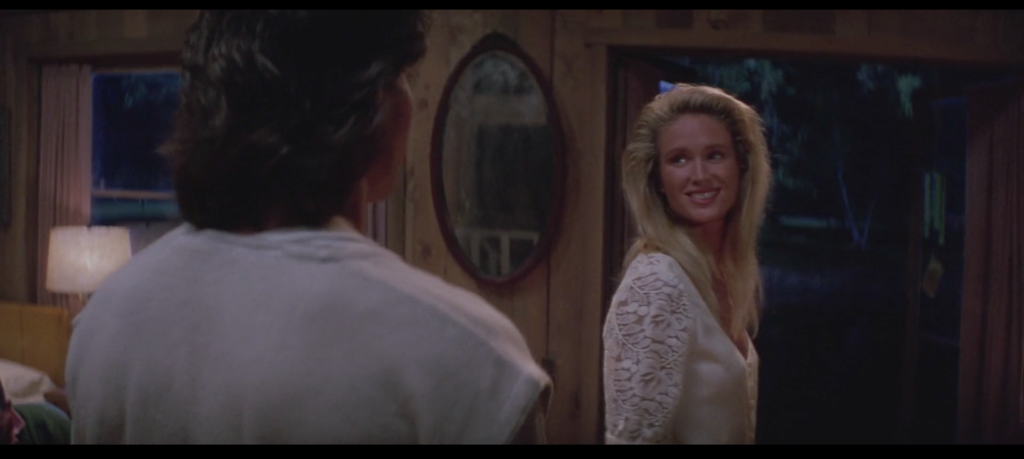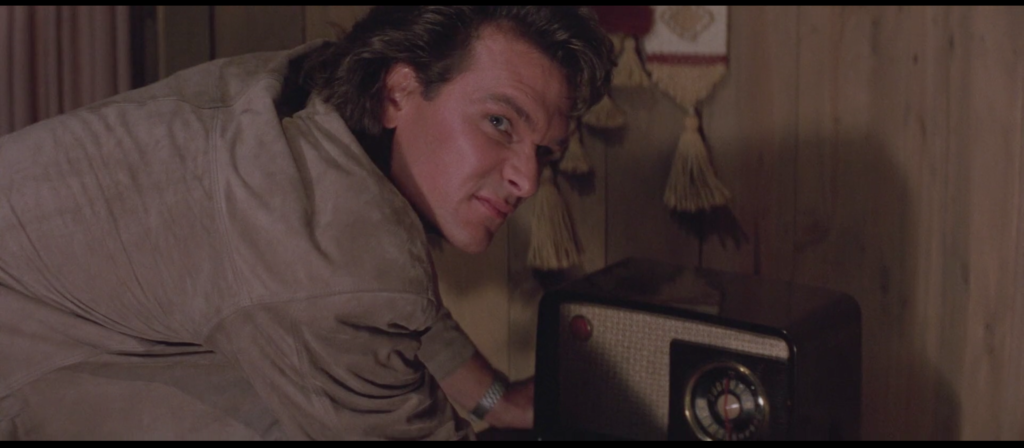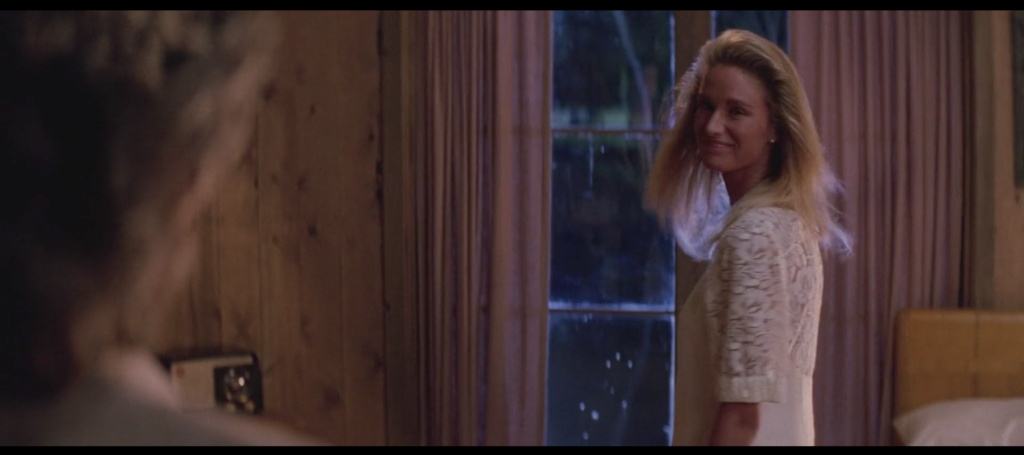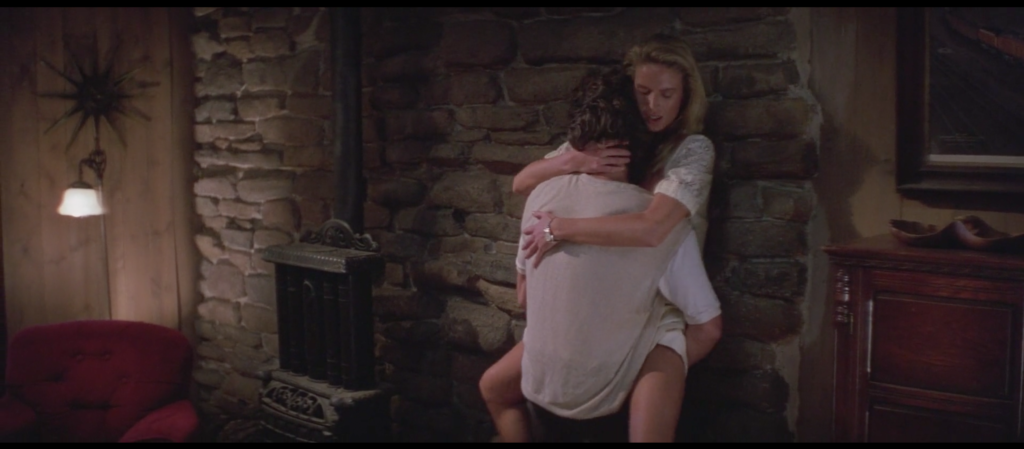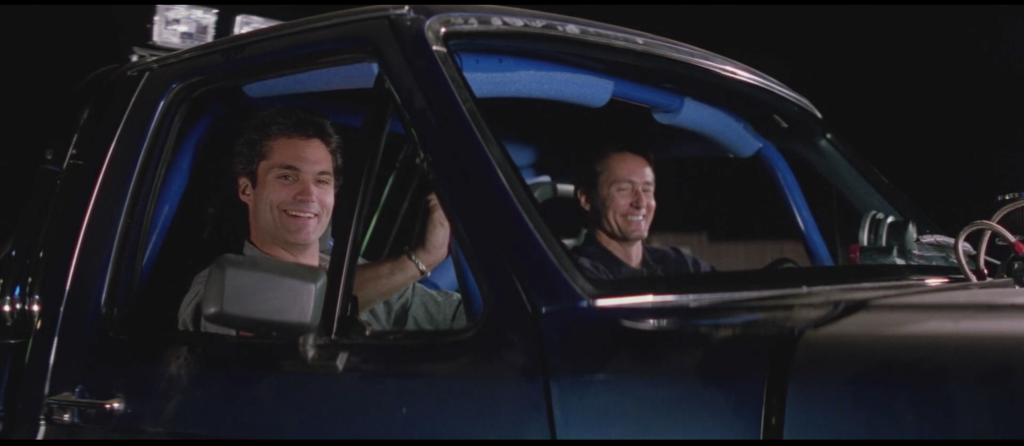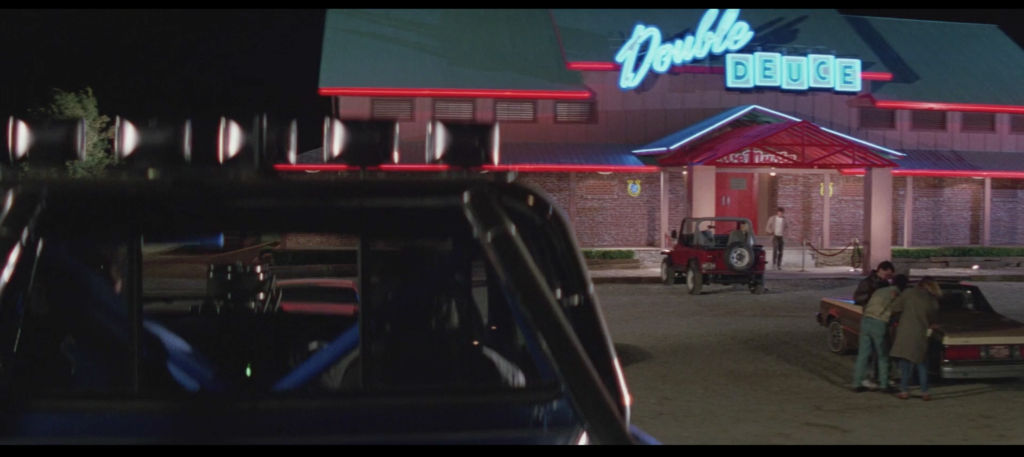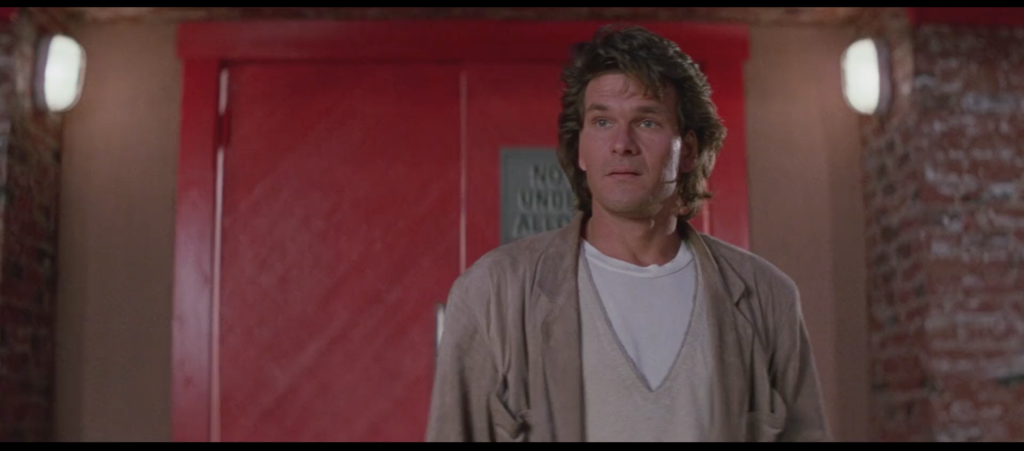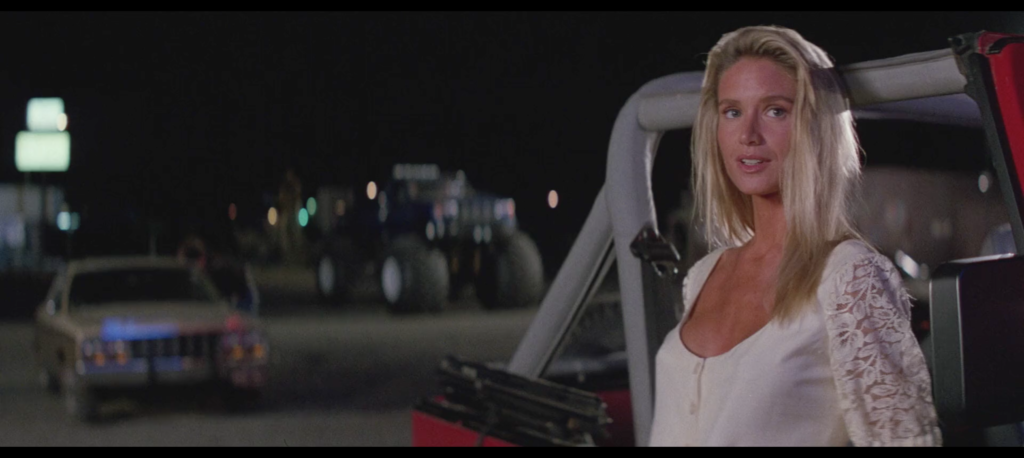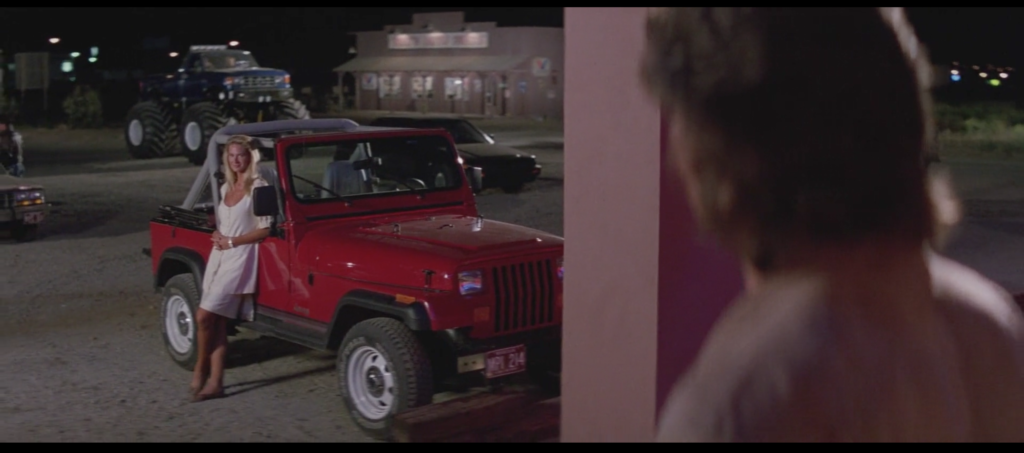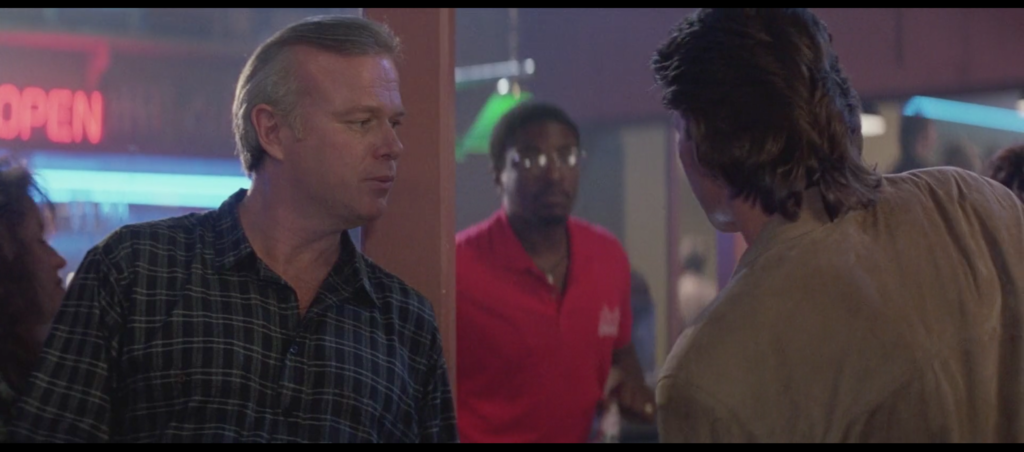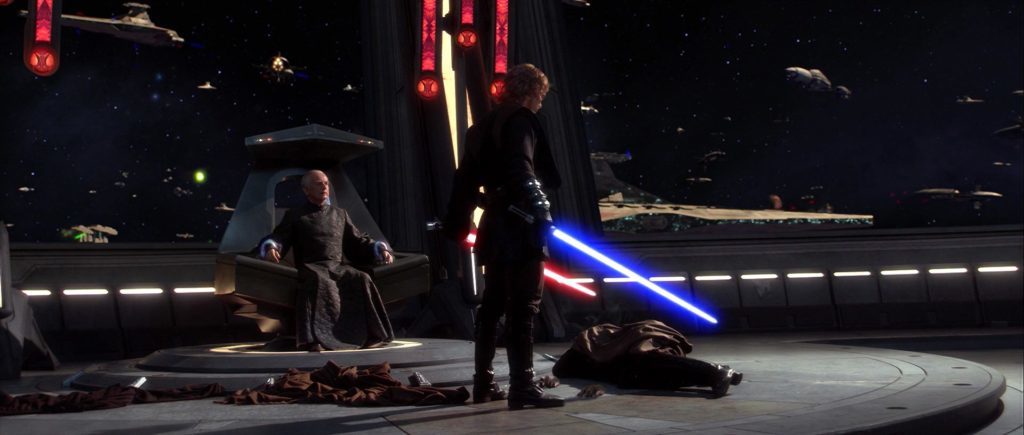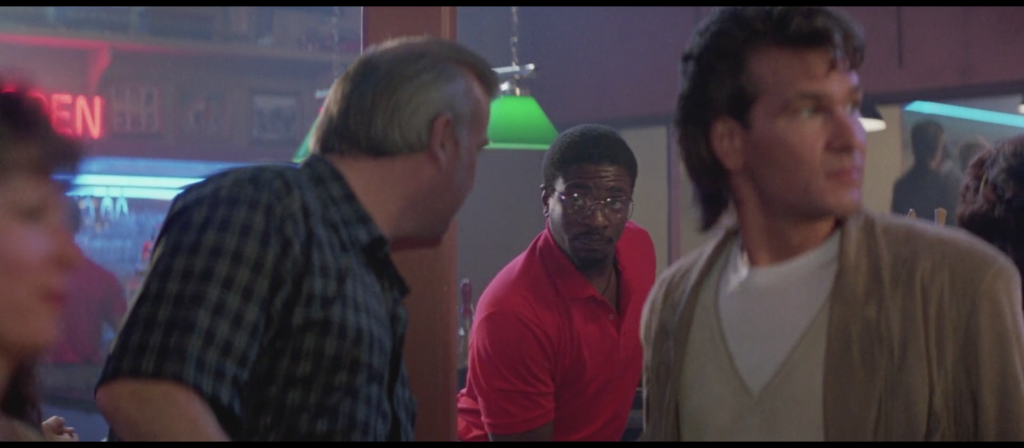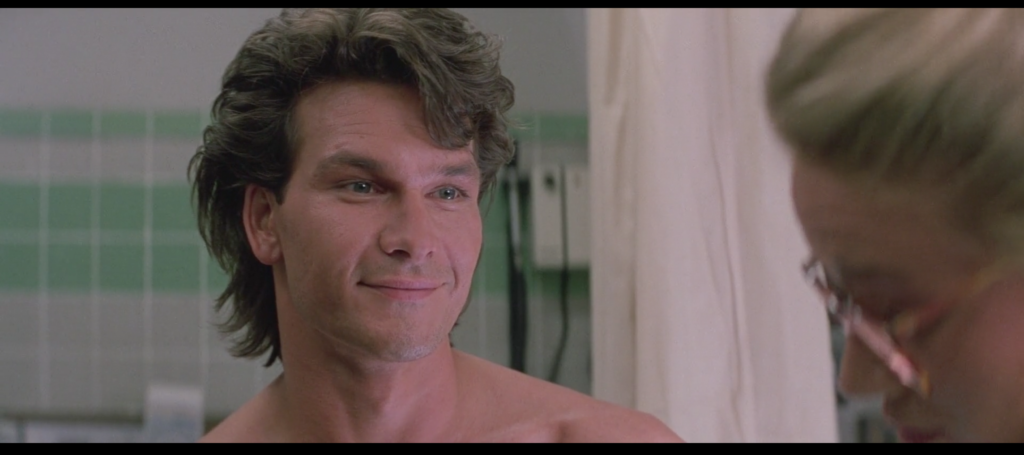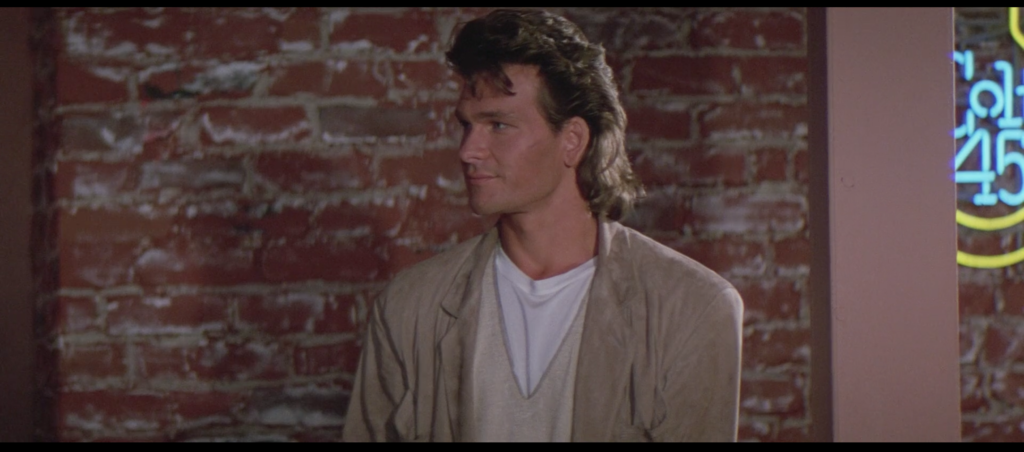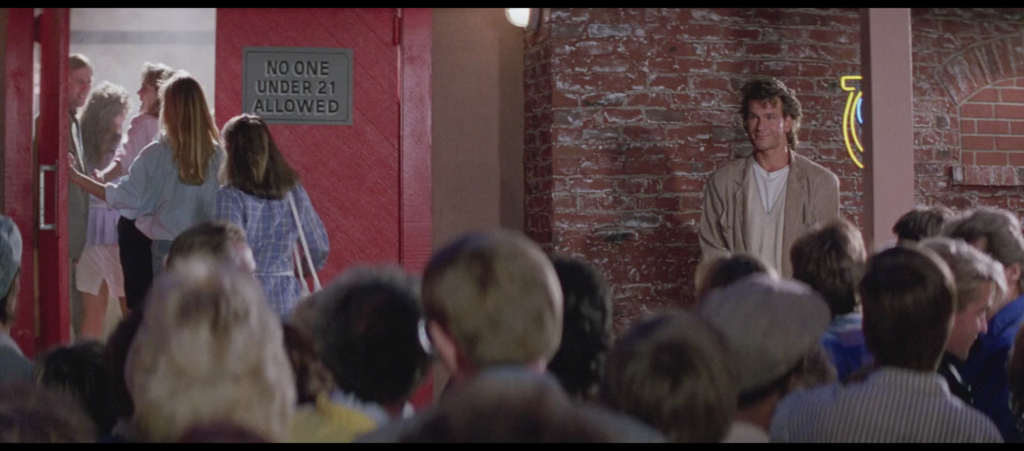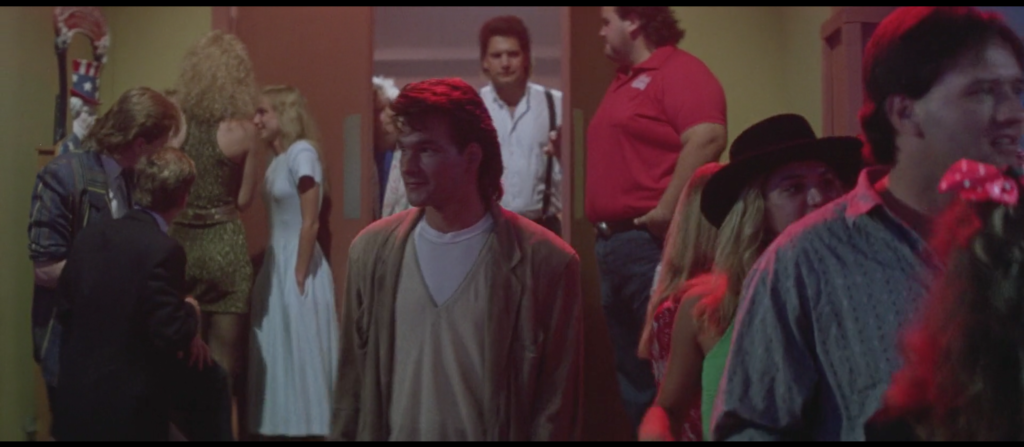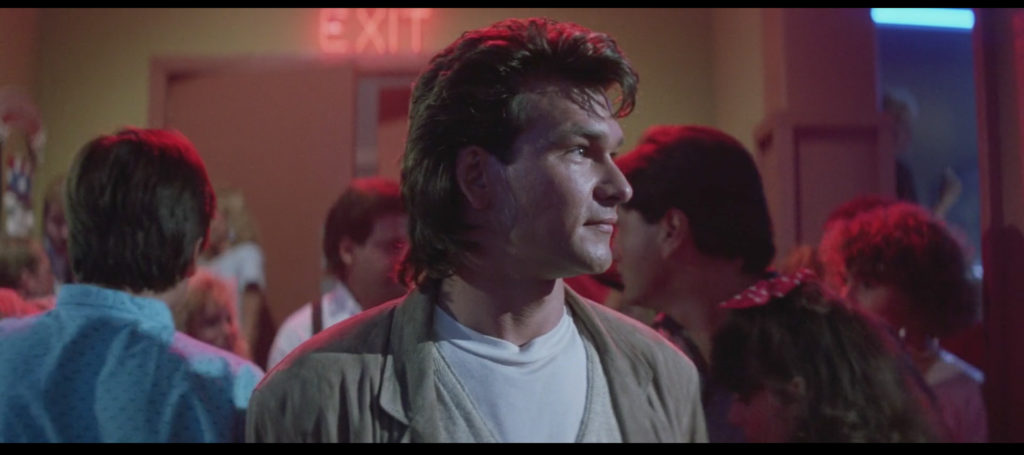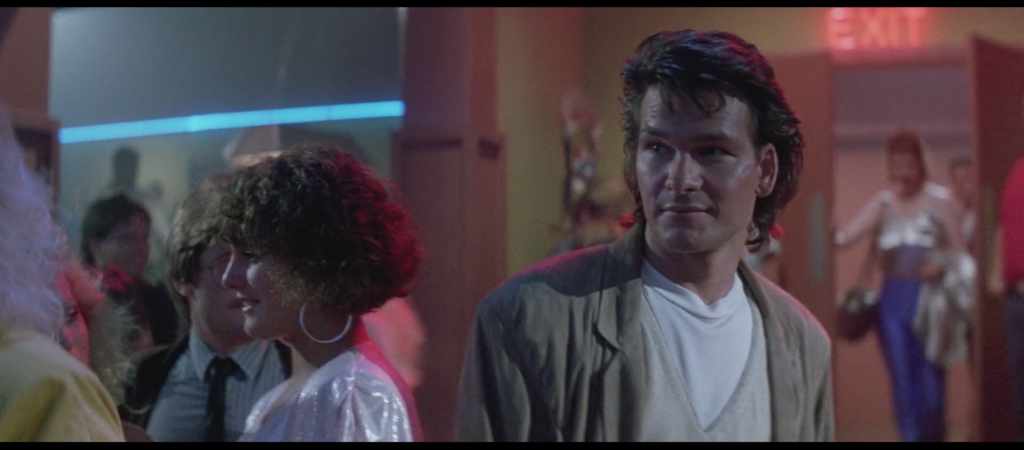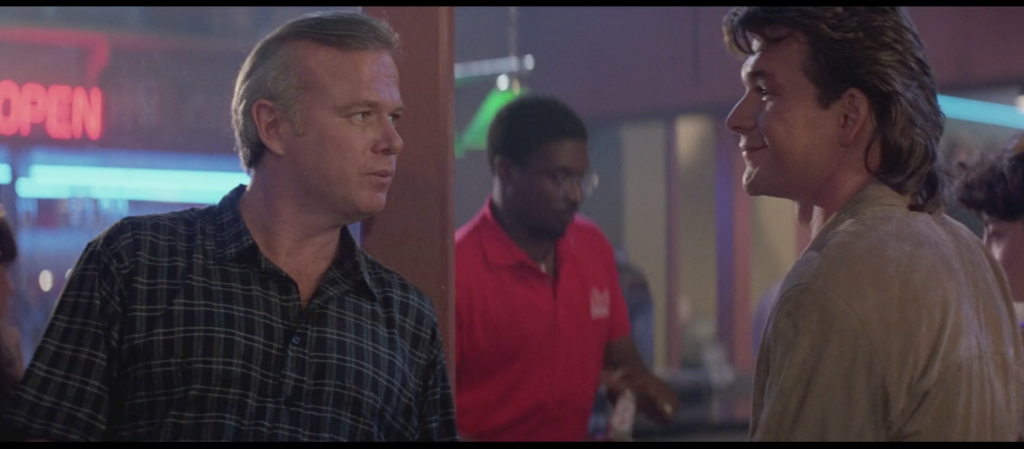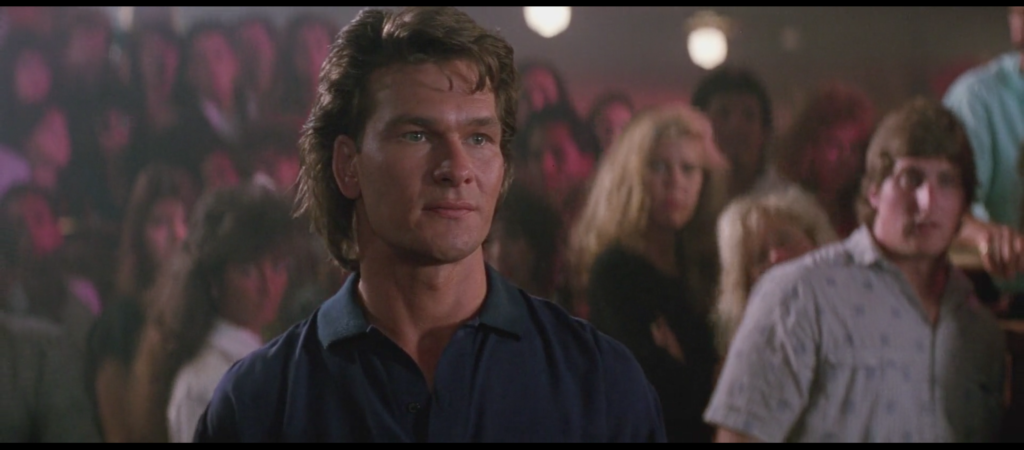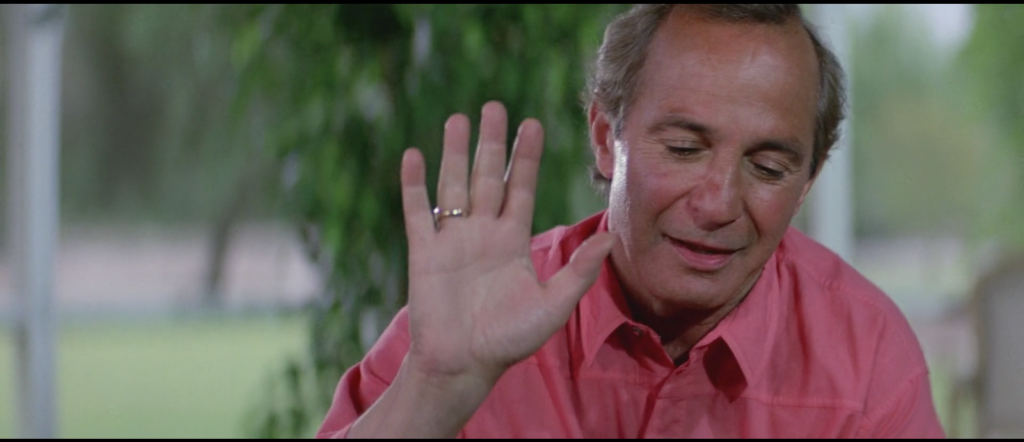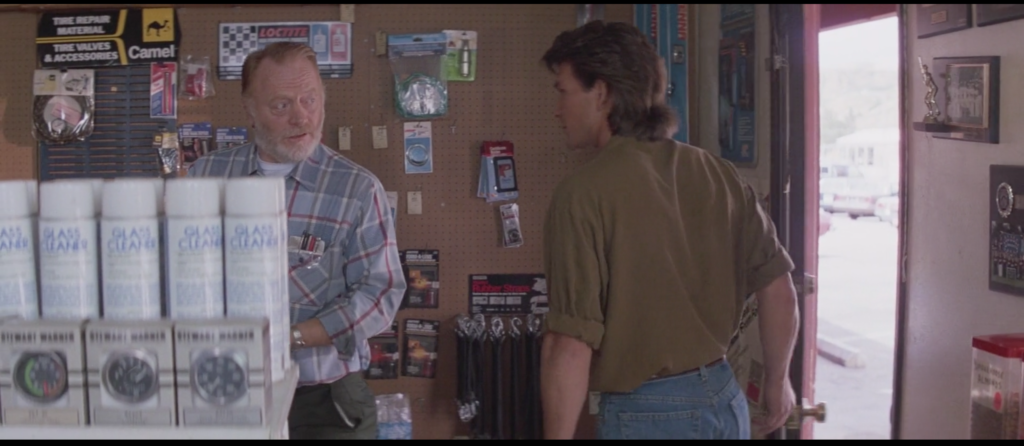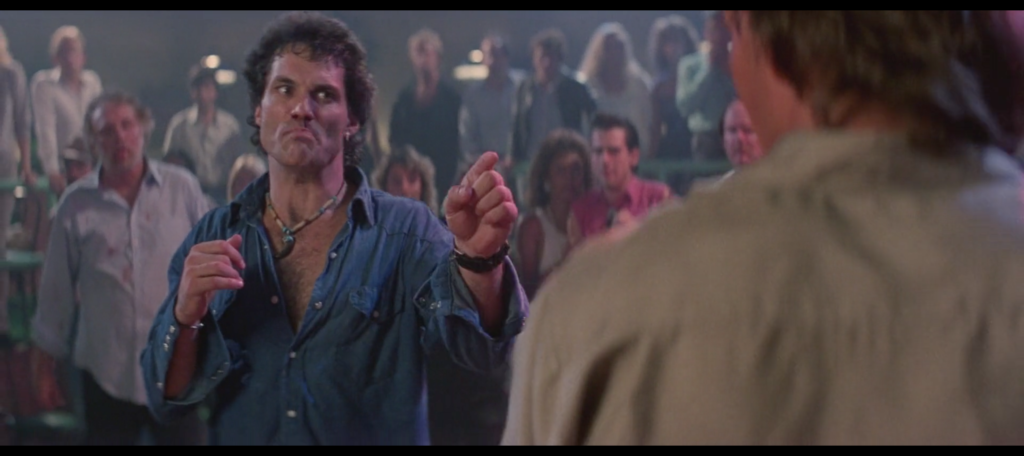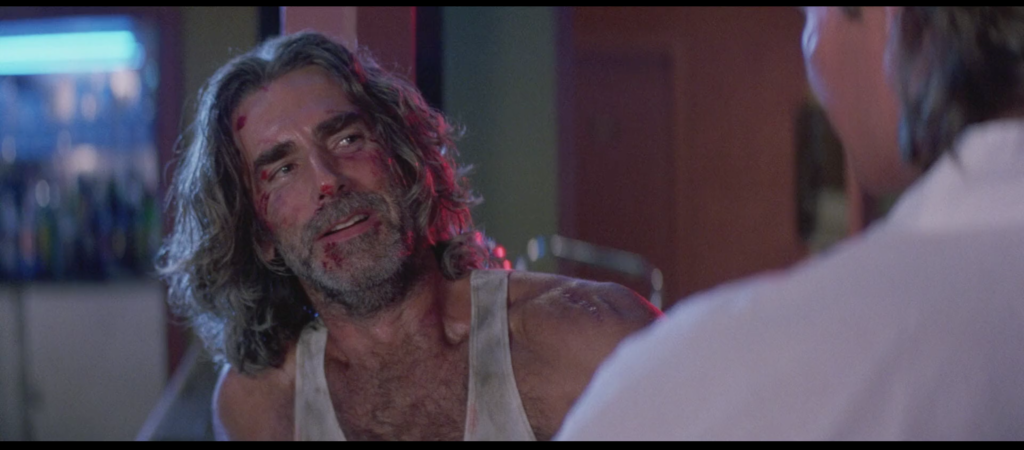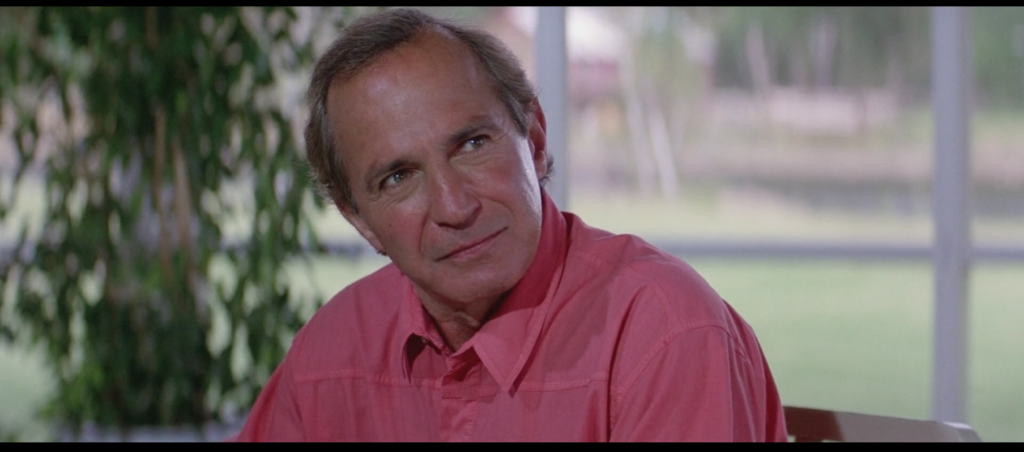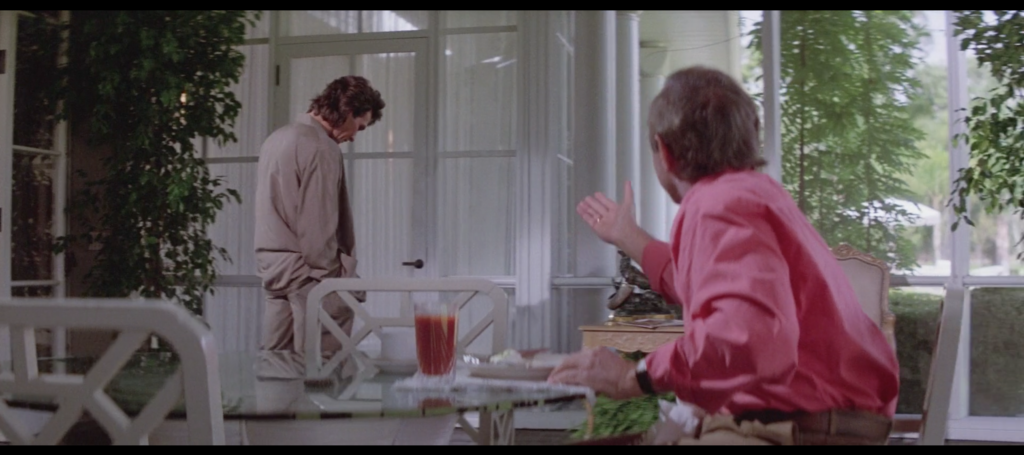Posts Tagged ‘dalton’
206. Tits Out for Pat Swayze
July 25, 2019A friend—one of the friends with whom I first saw Road House, now that I think of it—once told me back in my comics-critic days that I was effectively three critics in one. There was, he said, the guy who loves horror, the guy who cares a lot about properly staged action sequences, and (the briefest abashed pause here, if I recall correctly) the horndog. This felt pretty fair to me at the time. Add long takes to the mix and you’ve pretty much nailed my interests as a critic of film and television as well. Which is why it may surprise you (and him!) to learn that until two days ago, I had no idea that Kelly Lynch got her tits out during the sex scene from Road House.
Afterwards? Sure. I mean, they’re pretty hard to miss. As is her butt, and Patrick Swayze’s butt before it, and Sam Elliott’s pubic bush after it, and the topless dancers, and Denise’s strip tease, and Horny Steve and His Regular Saturday Night Thing, and (if we’re simply counting sexy bodies prominently displayed, not nudity specifically) Swayze’s glistening torso, and even Well-Endowed Wife’s pair of attitudes. This is not a film that wants to hide its horniness as a general rule.
But here’s how I know this is an effective sex scene: For a decade and a half I never gave Doc’s breasts so much as a glance. I was riveted by her face, limned by the moonlight; by Dalton’s face, gazing into hers; by her hands, exploring Dalton’s muscular chest through his, uh, beige sweater vest over white t-shirt combo; by his hands, covering hers, guiding hers, lowering them downward. It wasn’t until my partner pointed them out that I noticed them at all, and even then I wasn’t sure I’d caught what she’d said until I reviewed the footage.
But the sex scene from Road House casts a weird spell that way. Until three days ago, I believed that the initial penetration occurred before the pair kissed. The abruptness and intensity of the coupling and the tension of that near-miss kiss simply overwrote my memory of the real thing, which is that they prepare themselves for penetration before kissing but actually do exchange a short hard kiss before going through with it.
Go ahead, try to come up with another sex scene you can think of where its suggestive power outstrips its reality on screen this completely. It’s hard, right?
205. Near kiss
July 24, 2019By now they have put on the mood music, talked their weird talk, stalked or been stalked anxiously around the room. They have looked into each other’s eyes. He has touched her face, her hair. He has unbuttoned her blouse, exposed her breasts. He has rested his forehead against hers. She has put her hands on his shoulders, his chest. But no kiss, no, not yet. Just the promise of one, the suggestion of one, a feint in the direction of one. Lips a fraction of an inch apart, passing like ships in the night that will soon reroute and collide, though not before other vessels well to their south come together first.
204. Talking Dirty
July 23, 2019So here’s the game Dalton lays down in the run-up to sexual intercourse with Dr. Elizabeth Clay. He speaks first.
<switches on “These Arms of Mine” by Otis Redding>
<takes off jacket while stalking Doc backwards around the room>
“So I saw your picture in Red Webster’s place.”
“He’s my uncle.”
“Nice old guy.”
“He raised me after my parents died. It’s why I came back here. Now we take care of each other.”
“So how come you never got married?”
“I did.”
“What happened?”
“Didn’t work.”
“Why?”
“Guess I picked the wrong guy.”
The next thing you know, and I mean the next thing you know, both Dalton and Dr. Elizabeth Clay have exposed their genitals to one another.
You think I’m fucking around here? Watch the damn sex scene. He puts on the song, he starts backing her up around the room while taking off his jacket, he brings up an old man, she talks about how he raised her after the death of her parents and how she moved back to town to take care of him, he asks her why she never got married, she says she did but it didn’t work out, and bam, they whip out each other’s junk before they so much as kiss.
Excepting actual real-world atrocities I think you’d be hard pressed to find topics of conversation less erotic than what Dalton goes with while he’s clearly mustering up an erection he intends to insert into his willing partner. “Why does a crusty old fart have your picture on his wall” and “Why are you a spinster.” Guaranteed panty-droppers, huh?
But let’s not discount her replies. “My parents died when I was just a kid” and “I have elder-care responsibilities” and “I’m divorced,” says the woman who showed up at his work and went back to his place with the express intention of banging him. That’ll get a fella’s engine revving!
People focus on the Otis Redding, the accessing each other’s engorged genitals without kissing first, and the stand-up sex against a wall made of large rocks. It’s hard to blame them for that. And it’s not as if their body language and facial expressions track with what they’re saying in any way, so if you’re focused on that, which, look at them, why wouldn’t you be, then it’s understandable that you’d miss the chatter. But foreplay conversation that could fell a tree and reduce a swamp to a dust bowl should be included in any connoisseur’s discussion of the sex scene from Road House. After they say what they say it’s a miracle of the Dalton Path that they’re able to have sex at all.
202. I Sold My Soul to Rock ‘N’ Roll
July 21, 2019Or rather, Dalton and Dr. Elizabeth Clay do not sell their collective soul to rock ‘n’ roll. As Dalton flips on the radio to find some mood music, they get as far as one complete recitation of the titular phrase from the song by German heavy metal band Bullet before wrinkling their noses, nodding “no,” and changing the channel. It’s 1989, and a quick listen of that high, multi-tracked vocal chorus reads “hair metal.” It reads inauthenticity, pretty boys, heshers, idiots, poseurs, L.A.—you could just as well say “40-year-old adolescents, felons, power drinkers, and trustees of modern chemistry.”
My pop-cultural awareness began in 1988, when my grandmother got me Appetite for Destruction for Easter. It blossomed fully, to the point where I consider it the dawn of my life as a thinking consumer of popular culture, the very summer Road House came out, in the form of Tim Burton’s Batman. In between there somewhere, I started watching MTV. As such I can assure you that didn’t need to have Nirvana in the zeitgeist to figure that there was something suspect about hair metal at the time. You didn’t even turn your nose up at metal entirely. Metallica were gigantic already, thanks to the video for “One.” Living Colour and Faith No More had absolutely massive alternative-inflected hits with “Cult of Personality” and “Epic,” emphasizing groove rather than shimmy and slink. And though no one appreciates this now, Guns n’ Roses’ oppositional relationship to the poodle-haired likes of Poison, Slaughter, Winger, and their close personal enemies Mötley Crüe genuinely made Axl Rose the John the Baptist to Kurt Cobain’s Jesus Christ. It was that distinct.
Of course I doubt any of this would be relevant to Dalton and Doc. When we first hop into his Benz as he departs the parking garage back in New York (the “what do I look like, a valet?” scene), the station on the radio is 102.7. That’s WNEW, New York’s storied home for classic rock. You weren’t getting anything flashier than “Rebel Rebel” or Thin Lizzy on that. As we see from his friendship with Cody, roots rock—white blues, blue-eyed soul, and most likely the original African-American article as well—are Dalton’s specialty. Sure enough, the moment he stumbles across the opening “These…arms…of…miiiiiiiiine” from Otis Redding’s torch song of the same name, Dalton does not touch that dial.
The interesting thing here is that Bullet are not hair metal, not really. Here, have a look and a listen:
Mustaches? In my hair metal act? Not bloody likely. This is just straight-up party metal, its fast-paced rockin’ boogie part of a transitional sound that combined the increased punk-inspired ripped-denim sneer of the genre as displayed by New Wave Of British Heavy Metal bands with the sweaty good-time glam of Slade, the New York Dolls, Thin Lizzy to a certain extent, and the like. This was a popular move at the time—ask Quiet Riot or Twisted Sister, to say nothing of the Brits themselves—and there’s no reason Germans couldn’t do it too. (One look at the album cover will have you thinking of Spinal Tap’s faster-paced parodies, like “Tonight I’m Gonna Rock You Tonight”; that movie also came out in 1984.)
But Road House needed something that signified all that bad shit I listed above, and whether because it was cheaper or because music supervisor and future Interscope head/Beats by Dre billionaire Jimmy Iovine didn’t want to alienate his Sunset Strip contacts, Bullet got the nod. And insofar as the song sounds like the soundtrack to a barfight, perhaps it wasn’t such a bad choice. Dalton just does to the song what he’d do to its physical equivalent: end it quick.
201. Chez Dalton
July 20, 2019“It’s quiet,” Dalton says. “The horses let me know if anybody comes around.”
“I love it,” Elizabeth replies, her smile and voice as warm and sincere as if she had just gotten her first glimpse of her new dream home, which she has.
She doesn’t know that yet, of course, but why wouldn’t she fall in love with Dalton’s barn loft apartment. She met up with him earlier that night with the expectation of having sex with him provided nothing goes egregiously wrong, and so far so good. She’s into this guy. And this apartment could not be more this guy if he’d designed it himself.
Think of it this way. Dalton lives in a structure created to house the comforts that animals require. The closest neighbors are horses. The room is open to the outside world, allowing him free egress. It’s a place for a domesticated but still half-wild thoroughbred animal to rest, relax, and refuel before charging back out into the world unimpeded. This is Dalton’s stable, and the barn door is perpetually wide open. This horse can get loose anytime he wants. In the meantime, of course, he’s available for rides.
200. The sex scene from Road House
July 19, 2019It looks uncomfortable, like it would strain his back and abrade hers. It looks lackadaisical, like two grown adults couldn’t be bothered doffing the oceans of loose-fitting fabric in which they’re garbed before starting. It sounds awkward, since the verbal foreplay in which the participants engage consists solely of the woman discussing her ex-husband and her uncle. It sounds incongruous, with all of the above soundtracked by the platonic-ideal lust and soul and yearning of Otis Redding’s “These Arms of Mine.” It feels abrupt, as their hands move to each other’s belt buckle and underwear before their lips meet, when a kiss has only been teased. It feels brazen, as she takes him inside herself/he puts himself inside her after the briefest gesture in a kiss’s direction. It’s intimate, this decision to make love while deliberately eschewing certain forms of intimacy as if superfluous to the intimacy already established. It’s silly, so much so that first she and then he laugh in the middle of it from the sheer sexy ridiculousness of it all. It’s hot, watching this process unfold from zero, seeing two beautiful people get horny, knowing what’s happening to his body and to her body as a result, watching them do what bodies in those conditions are designed to do. It’s right there in front of us, the camera bringing us up close against their faces, their hips, their hair, their hands, his undulating body, her grasping legs. It’s Patrick Swayze and Kelly Lynch having sex standing up against a wall made of huge rocks. It’s the sex scene from Road House. It stands alone.
199. The new marshal in town
July 18, 2019Dalton is in a Western whether he wants it or not. That’s the message sent to him by Dr. Elizabeth Clay, who greets him as they meet up for a late-night rendezvous by saying “I hear you’re the new marshal in town.” “You heard wrong,” he response perfunctorily; he’s said “Opinions vary” with more force. I think that after the decision to not be nice to Brad Wesley, to treat it as personal rather than a job with Brad Wesley, Dalton is still struggling with that decision. The enormity of it pains him, as life changes forced upon us by circumstance often do. He can live with threats, obviously; that’s the nature of his job. But the meaning of the threats, the rationale behind them, his culpability in soliciting them by doing what he’s doing regarding Wesley—all of that is new, and hard to swallow. As late as their post-coital pillow talk several minutes or hours or whatever later he’s still talking about moving on, getting out of Jasper, finding a new adventure. He’s talking about it to Elizabeth, no less, whom he’s just bedded down (or rather bedded up). She’s the one who asks then, just like she’s the one who brings up the idea that he’s a lawman taming the Wild West, thwarting outlaws and bandits one barfight at a time, now. She additionally notes that his body will give out early at the rate he’s going through injuries, inflicted and sustained. She recognizes the tension at work in Dalton: His instinctual pursuit of justice and order and his determination to be a man bound by no law or order stand at odds. She, like he, is content to fuck away the difference for the time being. It’s amazing, the balm that a little pleasure can be in a life that’s fundamentally unsustainable.
198. Dig a hole
July 17, 2019“Work ain’t work when you’re having fun.” By Jimmy’s own definition, then, his bit of late-night = espionage outside the Double Deuce, where he and Ketchum catch Dalton and the Doc meeting up, isn’t work. The two men are having an absolute blast discovering that their boss Brad Wesley’s ex-wife is dating his new-in-town nemesis.
“Uh-oh…” says Ketchum wryly as they take it all in.
Jimmy chuckles, rears his head back slightly, and says “Dig a hole.”
The two men then chortle and guffaw at the prospect that one or more of the people they’re spying on will be slain and buried in an unmarked grave for the crime of being an item. It’s all in the way you tell it, I guess.
It’s a noteworthy moment for several reasons. First, it’s one of the few chances we have to see goons goon it up all on their own: no one to intimidate, no one to suck up to, just two peers enjoying their job together. We’ve seen how different Dalton feels under similar circumstances, chatting with old friends like Cody and Wade Garrett. We’ll see a bit more of it among the goons near the end of the film, when Pat, Morgan, and Tinker take a few moments to discuss a young woman of their acquaintance, before Dalton assaults the mansion they’re guarding and murders most of them. The same principle applies here. Left to their own devices, out from under the watchful eyes of either Dalton or Wesley, they’re good-time Charlies. In actor Marshall Teague’s full-throated rumble, “Dig a hole” may as well be “Laissez les bon temps rouler.”
Second, we get a glimpse of how they see their own boss through this instinctual, jocular reaction to what they’re observing. They don’t say “Uh-oh, I wonder what the boss is gonna say,” or even “Uh-oh, the boss is gonna be pissed.” They jump straight to “Uh-oh, it’s murderin’ time.” When they see Brad Wesley’s ex with another man, they just assume that someone’s gonna die for it, presumably at their hands or the hands of their fellow goons. It’s just how things are done here in Jasper. This off-hand wise-aleck remark reveals as much about life under Brad Wesley as Karpis tossing Red Webster’s store or the whiskey getting cut off at the Double Deuce. More, perhaps.
Third, see the eyelines in that image above? Jimmy and Ketchum are looking downwards from the front seat of their vehicle to spy on Dalton and the Doc. That’s because their vehicle is a monster truck.
Admittedly, such a vehicle presents certain advantages on a reconnaissance mission, providing mobile high ground from which to observe the surroundings. On the other hand, and see if you follow me here, they drove a fucking monster truck to a stakeout.
They’re in the same goddamn parking lot, no less! It’s not like they could be inconspicuous if they wanted to, but they’re not even trying to hide it.
Why do neither Dalton nor Elizabeth notice the professional killers staring at them and yukking it up while perched some ten feet in the air in a comically massive motor vehicle? Maybe all that smoke blurred Dalton’s vision. Maybe his cooler-sense fails him when he’s horned up. Maybe there are enough monster trucks tooling around the streets of Jasper that Dalton would have no reason to believe this is the one driven by the guy who tried to kick him to death. Maybe—and again, stay with me here—it’s an extremely goofy movie. It’s a matter of opinion, I suppose, and you know what they say about opinions. Just remember, “Dig a hole” is not an opinion. As far as Jimmy’s concerned, it’s a spoiler.
197. Whatever happened to predictability
July 16, 2019What you’re seeing here is the look on Dalton’s face just after he staggers out of the smoky Double Deuce and finds Dr. Elizabeth Clay waiting for him, and the look on Dr. Elizabeth Clay’s face as she looks back at him while leaning back against her car one frame later. I don’t think you need to be an expert analyst of body language or facial expressions or human mating rituals to figure out what’s going on here, and what will be going on shortly hereafter. The Doc is about to get lucky, and Dalton feels lucky about it. That’s predictable enough: They’re both right, as it happens. But how it happens—ah, friends and neighbors, there’s the rub. (The rub against a rock wall, specifically.) It will be absurd, romantic, laughable, red hot, impersonal, extremely personal, erotic, uncomfortable, uncomfortably erotic, erotically uncomfortable, giddy, bold, slightly impractical, intensely physical, eminently watchable. It will be, in short, the Road House of sex scenes. It could be nothing else.
196. Hotbox
July 15, 2019At the end of a long, close to perfect night, the Double Deuce is smokin’. Literally. After the evening represented by the “Roadhouse Blues” scene winds to a close, Dalton stumbles through the big red double doors of the Double Deuce in a cloud of smoke. He rubs his eyes, as if they’re dry and irritated. He breathes out a plume of smoke himself. “Cigarettes and exhaustion” is surely what director Rowdy Herrington and company were going for; “Raindrop, drop top, smokin’ on cookie in the hotbox” is what many a viewer receives. If you’d slapped some designer sunglasses on him, replaced his shapeless beige sport jacket with a fur coat, and shot this in slow motion it’d look like an old Snoop Dogg video. That image and vibe is certainly preferable to the alternative, which is that to get rid of the smell of cigarettes he’d probably need a Silkwood shower. But he’s not one to get rid of the fragrances of nature, to use Emmett’s memorable phrase, and in Dalton’s world the constant presence of lit ciggies is as natural as it gets. More than once we see him light up without even bothering to put a shirt on first. The man has his priorities. And you know what they say about where there’s smoke.
193. Why won’t they deliver
July 12, 2019Dalton may be all smiles, but Frank Tilghman has frustration to burn. Whiskey’s running low, you see, and oh how steamed he is about that. “I finally get this place just the way I want it and now we’re running out of booze,” he spits, with a sardonic half-laugh for emphasis at the end. “I’ve called every supplier I know,” he continues. “Why won’t they deliver.”
Expected a question mark at the end there, didn’t you? Yes, one would, wouldn’t one. But in that standard Road House flourish, the question is delivered as a statement. Yet something’s off here. This isn’t Doc or Dalton or Wesley supplying an answer they believe they already know—that Dalton feels entitled to collect money for beating people up, that Doc thinks Dalton’s life is too ugly to be a part of, that both Wesley and Dalton know he committed a crime not acted in self defense when he killed a man. Frank’s affect in every respect but the lack of a rising tone of voice indicates that he has no clue why people are refusing to sell him liquor anymore. It’s just a little thing that he phrases it as if he knows, right?
Well, Dalton knows the answer, that’s for sure. “Wesley,” he says authoritatively, before grabbing the phone and making a call we will later be able to deduce was to his mentor Wade Garett for help. It’s interesting, though, to watch Tilghman’s face here. When Dalton answers his “question,” he doesn’t react at all. No surprise, no “I knew it,” no “Jesus, he’ll stoop to anything,” no “goddamn that bastard”—flat. He just takes it right in stride.
Almost. His question is a non-question, yeah, and his response to the answer is nonexistent. But when Dalton turns toward the phone, look at Frank’s eyes. Follow them as he gives Dalton a quick once-over. It’s not like he hasn’t seen Dalton before, and as much of a pleasure as it is to look at the guy it seems like Tilghman’s mind should be on other things right now. Things like the matter of the liquor blockade of his bar, the culprit behind which Dalton has just named and against whom he now appears to be placing a call for aid.
Unless that is what’s on his mind when he looks Dalton up and down while the cooler isn’t looking. But why would that be? Why would Tilghman size Dalton up while thinking about Brad Wesley’s role in the Double Deuce’s plight? Why would he want to get a good look at the man who just informed him Wesley is responsible? Why would he sneak an analytic glance at the man he’s effectively placed in charge of battling Brad Wesley for control of the town, after feeding that man the information required to initiate the next round of hostilities? Why would he want to get a very close read on Dalton’s affect, his body language, the clues he might give as to how deeply he’s thought this matter through? Why did he not react with surprise when Dalton told him what he’d figured out? Why did he supply the question as if he already knew the answer himself? What is the specific concern regarding Dalton, and Wesley, and his own relationship with both men, that leads Frank Tilghman to act so suspiciously?
192. ‘Whiskey’s Running Low’: The Tragedy of Keith David in ‘Road House’
July 11, 2019The man in the red shirt is Keith David. You may remember him from his roles in John Carpenter’s The Thing and They Live, two of the best science fiction and horror films ever made. In each he plays the main foil to the protagonists—rough-hewn salt-of-the-earth working-class white-guy types, with tough-as-nails attitudes and impressive heads of brown hair, who find themselves unexpectedly drawn into conflict with forces larger than themselves. Road House, you’ll note, stars Patrick Swayze as a rough-hewn salt-of-the-earth working-class white-guy type, with a tough-as-nails attitude and an impressive head of brown hair, who finds himself unexpectedly drawn into conflict with a force larger than himself.
Naturally, in Road House, Keith David plays a bartender whose sole line of dialogue is “Whiskey’s running low.”
That’s not quite all there is to the role. His name, uttered by both Tilghman and Dalton in this scene, is Ernie, and getting named is an honor precious few supporting characters in this film enjoy. He’s mentioned by name more than all the other bouncers and bartenders and waitresses still employed by the Double Deuce at this point in the film combined, save for Carrie Ann, who says her own name and gets it yelled at her by Pat McGurn. Everyone else? Bupkis.
What’s more, he’s listed with a surname in the closing credits. This too is more than can be said for virtually anyone in the movie. Jimmy, for example, went by “Jimmy Reno” during filming—you can find interview clips with Patrick Swayze in which he calls that character by name, it comes up frequently in interviews with actor Marshall Teague, and it’s in the IMDb listing—but is merely “Jimmy” in every official respect. Dalton himself only gets a mononym unless you inspect his medical file.
Most strikingly, Keith David appears in the opening credits. He’s billed fifth, after only Patrick Swayze, Ben Gazzara, Kelly Lynch, and Kevin Tighe, and just before Kathleen Wilhoite. The actors who play Emmett, Red, and Denise all get lumped together in a single triple chyron, which is fair enough. Sam Elliott gets a “And SAM ELLIOTT” to conclude the cast listing, which is appropriate. Jeff Healey slides in later on via an “Featured Music Performance by The Jeff Healey Band” slug. Other characters you think might reasonably get listed up front—Jimmy, Tinker, O’Connor, Ketchum, Morgan, Pat, Jack—aren’t there at all. Ernie’s fellow bartender, who’s there since the beginning, is entirely uncredited.
If you’ve watched David deftly dance between antagonist, supporting character, and stealth protagonist in The Thing, or if you’ve watched his world-building alley fight with “Rowdy” Roddy Piper in They Live, you probably have some questions about all this. God knows I do.
As best I can ascertain, partially from half-remembered poorly sourced comments in various Road House posts across the internet, and partially based on my own conjecture, is that Ernie Bass was originally a much more prominent character, the bulk of whose storyline wound up on the cutting room floor. I suspect he was a famous bartender, whom Dalton brought in to elevate the Double Deuce’s standing further still—surrounding himself with a surrogate family of old friends which also included Cody, his bandmates, and Wade Garrett. While the material was cut for time, contractual obligations kept David in the picture and in the credits.
A questionable decision, to be sure. Were David cast in a fighting role he’d be an invaluable asset to the film, and even as simply a gnomic presence dispensing basso profundo wisdom behind the bar he’d be a huge get. Instead? He hands Dalton a coffee with a nod of acknowledgement. He tells Tilghman “Whiskey’s running low.” He hands Dalton a phone. He looks at Wade Garrett. He looks at Wade and Dalton together. Exit Ernie Bass, pursued by an editor.
191. Pain don’t hurt revisited
July 10, 2019When I first addressed “pain don’t hurt” I did so from the perspective of Dr. Elizabeth Clay. She’s in the process of mending a knife wound in the side of a man who has to be the single oddest person she’s ever treated, and he drops that on her? Once you’ve seen the whole movie, once you know what we know about her—her reaction to Dalton’s violent job, her feelings for him as a person she cares about and is more afraid for than afraid of, her past relationship with Brad Wesley for whom the opposite is true—you know that line probably knocked her on her ass a bit. Enough to get her to accept his offer of a date for coffee, anyway.
But look at him! Look at the shit-eating grin on the face of James Dalton after he tells a trauma surgeon or whatever she is that pain don’t hurt. Actually, scratch that, just look at the grin, the smile, the smiling eyes too. Patrick Swayze, the god, at work, showing you just how smitten he is with this woman already. I’ve seen lovers in real life look at each other when the other isn’t watching, and that’s what it looks like. Goofy, glad, unguarded. It’s moments like these when you take off your metaphorical shirt and expose your figurative wound and think “I trust this person to care for this” and just smile at how lucky you are to have found them.
It changes how we read Dalton’s self-evident self-satisfaction when he says his three-word maxim, doesn’t it? Because he’s proud of the line, and he’s even prouder of the lifetime of experience in word thought and deed that led him to draw that conclusion, but he’s proudest of having said it to this fascinating woman.
I’m not saying he’s like a little boy trying to please Mama or a puppy gazing with love at his master. I don’t think Dalton feels subordinate to her in that way any more than he feels subordinate to anyone else save Wade Garrett. (Man, that’s an essay waiting to happen.) I’m saying he’s pleased to show her the best of himself, in every respect: his perfect body, his sharpened mind, and his mastery over both of them. He’s happy to impress her. He’s happy to be impressive. Judging from his face I don’t think he’s ever been happier to be impressive. He’s finally found someone worth impressing.
189. All Smiles No Blues
July 8, 2019A partial list of things Dalton smiles at during the “Roadhouse Blues” scene in Road House:
- The parking lot
- The crowd waiting in line to get in
- The guy counting attendance
- Jack the bouncer
- The crowd to his left
- The crowd to his right
- The Jeff Healey Band
- The pool table area
- The dining area
- The crowd at the bar
- Ernie the bartender
- His coffee
- The crowd on the dancefloor
- Frank Tilghman
- The prospect of taking care of Frank Tilghman’s problems
And the night is still young for him, too! By the time it’s over he’ll also have smiled at Dr. Elizabeth Clay in his parking lot, Dr. Elizabeth Clay in his apartment, Dr. Elizabeth Clay in her car which he’s driving, Otis Redding on the radio, Dr. Elizabeth Clay on his erect penis, and Dr. Elizabeth Clay nude on his roof. (Otis seems like the odd man out there until you consider his vital role in that particular progression.) None of these smiles are sardonic or wry. None are directed at stop signs torn from the ground and speared through his car windows, or at people who have or soon will have tried to stab him to death. These are genuine smiles of happiness, from a man who finds himself surrounded with the best things in life: happy crowds, good drinks, admiring proteges, soul music (blue- and brown-eyed varieties), Kevin Tighe, open-roofed motor vehicles, public nudity, the welcoming sex organs of a beautiful woman with a doctorate degree. The Dalton Path leads to a far green country.
185. “I think it’s time for you gentlemen to leave”
July 4, 2019“I think it’s time for you gentlemen to leave” is the first thing we hear Dalton, the second greatest cooler in North America, say in Road House, the film about him. I’m ashamed, however, to say that it’s taken me over half a year to write about it. To paraphrase George Harrison on Ringo Starr, the phrase looms large in his legend.
There’s a reason I avoided specifying the sentence’s terminal punctuation, and it’s because Patrick Swayze’s line reading defies our understanding of the very concept of the sentence. “I think it’s time foryougentlemen to leave“: Dalton walks up to the scene of a Knife Nerd disturbance and these words come spilling out of his mouth in a controlled burst. “I think it’s time“: Face stoic, he leans hard on the last word, letting them know the time has come for…something; “foryougentlemen”: It comes out like a child sayin “LMNO” in the middle of the alphabet, as if “gentlemen” is but a courtesy he’d just as soon skip past; “to leave“: the initial “t” is hard, the tip of the tongue taking a trip of two goons down the palate to tap, at “to,” on the teeth, and then right into “leave,” emphasis his, the message clear, get the fuck out before he stops calling you gentlemen, you don’t have much time left.
The delivery is magnetic, engaging, evocative of the entire Dalton persona that awaits us, commanding yet polite yet petulant, tremulous with suppressed violence and the strain of high ideals, ready to be peeled back, layer by layer, like an onion, like a daydream, or a fever.
184. Wesley Say Relax
July 3, 2019“Relax, relax!” says Brad Wesley at the precise midpoint of the film Road House—57:02 down, 57:02 to go. He’s telling his guest, Dalton, to chill out about the whole “this guy just sent his goons to pick me up and paraded me past his abused girlfriend so he could sit me down in his breakfast nook and tell me he thinks I murdered a man in cold blood” thing. I’d probably tell him to relax too, if I saw him getting up from his chair in anger and believed him to be a remorseless killing machine!
After Dalton gets up, fuming, Wesley does his RELAX, DON’T DO IT bit and then asks, purely hypothetically of course, how much money it would take to get Dalton to come work for him if he had a bar that needed cleaning up.
“There’s no amount of money,” Dalton says, and storms out.
And I will say this for Road House: The midpoint of the movie—the turning point, if you will—really is the midpoint of the movie.
This scene is where it stops being a job and becomes something personal. This scene is where it stops being time to be nice and starts being time to not be nice. This scene is where Dalton starts to break his own Three Simple Rules. This scene is where the Dalton Path diverges in a breakfast nook and Dalton begins to take the one less traveled by, perhaps because it is littered with corpses. Relax? Don’t do it.
180. Three Imaginary Boys
June 29, 2019Brad Wesley is not the only character in Road House in whose eyes Dalton is but a boy. Three others label him as such, and they could not be more different in tone and intent.
First up is Red Webster, one of the Four Car Salesmen of Jasper, Missouri. An avuncular presence in the film—literally: He is Dr. Elizabeth Clay’s uncle—he asks if Dalton is “the boy from the Double Deuce” when our hero shows up at his store before it opens to have various parts of his car replaced. Just a friendly, getting-to-know-you inquiry, from a guy calling another guy “boy” because he’s younger and he’s just arrived in town. Here, “boy” connotes “newcomer,” someone who is experiencing the world around him with fresh eyes, and who finds himself welcomed by those around him. Excepting the clientele of the Double Deuce as currently constituted, of course.
Next is Jimmy, Brad Wesely’s right hand and bastard son [source for this claim?]. “Your ass is mine, boy,” he growls, gesticulating for emphasis in case the owner of the ass of which he is claiming emphasis was unclear. Wesley has just stopped Jimmy from taking on a roughed-up Wade Garrett and a fresh-to-the-fight Dalton 2-to-1 in the Double Deuce, the night Wesley’s men blow up Red Webster’s store and Denise does an aggressive striptease to further assert Wesley’s dominance or something. Here, “boy” means a man less experienced, less tough, less dangerous, less of a man; Jimmy will use the term again when he sneers at Dalton’s fighting prowess during their eventual mano a mano showdown. (His father, spiritually anyway if not biologically, Brad Wesley will pick up the ass-owning baton and run with it, by the way, but not before Jimmy returns to that well implicitly when describing what he used to do to guys like Dalton in prison.)
The third and final boy-sayer is Wade Garrett. Staggering into the Double Deuce the night after Dalton kills Jimmy, Wade has been badly wounded in a fight with three unspecified Wesleyan goons. Dalton realizes that if Wade is still alive, it could be that the hammer is slated to fall on Elizabeth. He rushes out to find her, but not before assuring Wade that he will grant his mentor’s wish at last: They will leave this town and never look back, allowing Wesley to win rather than keep up a fight that by rights isn’t theirs. Wade looks up at the younger man and smiles. “Attaboy, mijo,” he says. Mijo, of course, means “son”; this is the “boy” of approval, of pride, of love. This is the “boy” of a dying parent’s love for his only child.
179. Smart boy
June 28, 2019At the time of Road House‘s filming Patrick Swayze was 36 years old, Ben Gazzara 58. Assuming their characters are the same age that makes Brad Wesley technically old enough to be the younger man’s father, though he’d really have had to make the most of his downtime in Korea to pull it off. Still, 36 is barely a boy’s age in hobbit years, let alone human ones.
Yet “boy” is the diminutive Wesley chooses to employ when favorably comparing the stalwart cooler to his own asshole grandfather: “But you—you’re a smart boy, aren’t you, Dalton? You’re just not too realistic.” He’s intelligent, but a child. He’s not an asshole like Grandpa Wesley, but he’s not a great man like Brad Wesley either. It’s backhanded compliments all the way down.
Or is it? Wesley repeatedly calls his beloved goons his “boys.” And sure enough, before this conversation is through he offers to hire Dalton to bounce on his behalf. It’s an invitation/initiation into the Lost Boys of Jasper that Dalton leaves on the table, but still. Brad Wesley is the only adult in the room, which makes everyone else children in his eyes. He is also the father of Jasper, Missouri, making everyone else his children in his eyes. His destiny, he says, tells him to gather unto him what is his. Are we all that far afield from Suffer little children, and forbid them not, to come unto me? For theirs is the kingdom of Jasper.
176. Human
June 25, 2019“Oh Christ,” says Brad Wesley to Dalton, “you get paid for beating people up! Tell me you don’t love it. Of course you do! You wouldn’t be human if you didn’t!” It’s a revealing moment for two reasons. First, it’s the third time in this scene alone that Wesley has employed his favorite blasphemous expletive. I’m going to assume that “Ben, you said ‘Christ’ three times that take, do you think we can go again” was not going to cut any ice on that particular set, so there’s that, but recall which character spreads a gospel with a wound in his side. Second, Brad Wesley’s defining characteristic of humanity is the enjoyment of establishing dominance by inflicting pain, particularly in exchange for cash. This squares with everything we know about him: hiring goons to strong-arm the other weird old men who own businesses around town, beating his girlfriend, citing his survival of “Korea” and “the streets of Chicago” as the sole points of interest in his pre-Jasper biography, festooning his home with the stuffed corpses of literally dozens of different slain animals. (Trust me, you haven’t seen the half of it.) If Dalton needed any more evidence that this is a man who cannot be negotiated with, he has it now. But third, when you turn it around in your mind, you can see it as proof that he does care about his “boys,” the goons. If getting paid to beat people up is a way to do what you love and love what you do, if it proves your essential humanity, then what a gift he has bestowed upon Jimmy, Ketchum, Karpis, O’Connor, Tinker, Morgan, Mountain, and his sister-son Pat McGurn, all of whom he pays to beat people up. For Brad so loved the goons, that he gave his only begotten cash, that whosoever worketh for him should not perish, but have everlasting life.
175. “You bet your ass I have”
June 24, 2019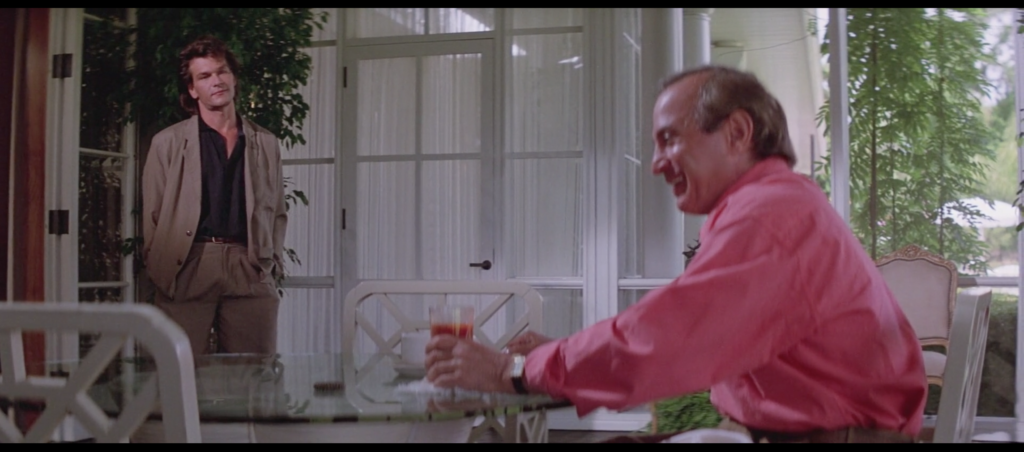 About the only time I find Brad Wesley appealing as a person, not just entertaining but “ha, this guy’s alright,” is when he laughs and admits he’s robbing the town of Jasper blind. By now you know his litany of achievement: In the name of the 7-Eleven, the Fotomat, and the JC Penney, Amen. After he runs through the catechism, Dalton observes that he’s gotten rich off the locals, intending it to be a charge of parasitism delivered as a balls-and-strikes observation. Wesley doesn’t give half a shit how Dalton intended it, since it’s true, and he can afford to admit it. He grins and chuckles and says in Ben Gazzara’s bullfrog rumble “You bet your ass I have.” He goes on from there, announcing he’s going to get richer, that acquisitive wealth is his destiny, that he’s gathering unto him—he says “gather unto me” in so many words, amazingly—what is his. But that’s the whip cream and the sprinkles and the hot fudge and the maraschino cherry on top. The real banana split of the thing here is straight-up laughing at a guy’s attempt to own him for making money by taking it from other people and going “yeah, and?” You don’t need to admire what he’s doing to appreciate the well-deserved self-confidence with which he’s doing it. I hear Dalton’s braggadocio when he talks to his assembled bouncers about how it’s his way or the high way, with none of the “well gee I suspect it’s always been that way, when a feller earns hisself a degree from NYU and needs to make a livin'” faux humility he serves up elsewhere. I hear my talented and brilliant friends when they’re like “Fuck off, I’m talented and brilliant and deserve to be recognized as such,” one of my favorite things that any of my talented and brilliant friends ever do. They are, and they do, and others should indeed fuck off. Unfortunately for all concerned Brad Wesley isn’t a TV critic or a cartoonist, he’s a gangster who’s willing to lie, steal, and even kill if it means Jasper gets a Sam Goody. But in this way, and possibly only this way, I like the cut of the man’s jib. Alright, this way and the way in which he swerves all over the road while singing “Sh-Boom.” Those two ways.
About the only time I find Brad Wesley appealing as a person, not just entertaining but “ha, this guy’s alright,” is when he laughs and admits he’s robbing the town of Jasper blind. By now you know his litany of achievement: In the name of the 7-Eleven, the Fotomat, and the JC Penney, Amen. After he runs through the catechism, Dalton observes that he’s gotten rich off the locals, intending it to be a charge of parasitism delivered as a balls-and-strikes observation. Wesley doesn’t give half a shit how Dalton intended it, since it’s true, and he can afford to admit it. He grins and chuckles and says in Ben Gazzara’s bullfrog rumble “You bet your ass I have.” He goes on from there, announcing he’s going to get richer, that acquisitive wealth is his destiny, that he’s gathering unto him—he says “gather unto me” in so many words, amazingly—what is his. But that’s the whip cream and the sprinkles and the hot fudge and the maraschino cherry on top. The real banana split of the thing here is straight-up laughing at a guy’s attempt to own him for making money by taking it from other people and going “yeah, and?” You don’t need to admire what he’s doing to appreciate the well-deserved self-confidence with which he’s doing it. I hear Dalton’s braggadocio when he talks to his assembled bouncers about how it’s his way or the high way, with none of the “well gee I suspect it’s always been that way, when a feller earns hisself a degree from NYU and needs to make a livin'” faux humility he serves up elsewhere. I hear my talented and brilliant friends when they’re like “Fuck off, I’m talented and brilliant and deserve to be recognized as such,” one of my favorite things that any of my talented and brilliant friends ever do. They are, and they do, and others should indeed fuck off. Unfortunately for all concerned Brad Wesley isn’t a TV critic or a cartoonist, he’s a gangster who’s willing to lie, steal, and even kill if it means Jasper gets a Sam Goody. But in this way, and possibly only this way, I like the cut of the man’s jib. Alright, this way and the way in which he swerves all over the road while singing “Sh-Boom.” Those two ways.

